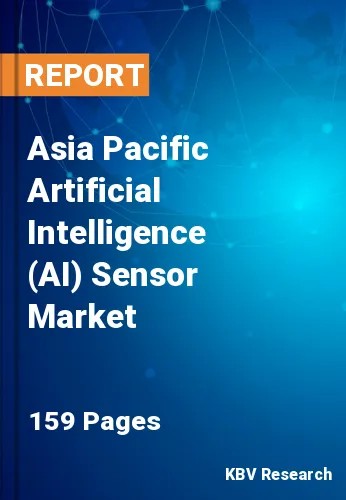The Asia Pacific Artificial Intelligence (AI) Sensor Market would witness market growth of 39.9% CAGR during the forecast period (2023-2030).
Artificial intelligence (AI) sensors collect audio, visual, and motion input information using various technologies, including cameras, microphones, accelerometers, and gyroscopes. Then, to choose the best course of action and understand the data, AI algorithms are used. Applications like autonomous vehicles, robotics, surveillance systems, and smart home gadgets heavily rely on AI sensors. These sensors help AI systems better comprehend and navigate the environment by giving them valuable data.
The development of AI in several applications is the main force behind the growth of AI sensors. AI technology is gaining the most popularity as it helps to resolve difficult issues throughout a number of areas, including education, entertainment, health, utilities, and transportation. The five types of AI applications include reasoning, knowledge, planning, communication, and perception. The ability of AI technology to rationalize enables the logical deduction of solutions to difficulties.
The management of financial assets, processing financial applications, games, evaluating legal issues, and autonomous weapon systems benefit tremendously from AI. Additionally, AI can forecast knowledge regarding processes, including medicinal development, media suggestion, financial market trading, and fraud prevention. AI makes it possible to define and reach goals for planning through demand forecasting, logistics, predictive maintenance, scheduling, and navigation. Real-time transcription, intelligent assistants, and voice control are just a few examples of the technology that makes it possible to understand spoken and written languages. As a result, it is helpful in applications related to ordinary business and healthcare.
Japan’s digital health industries’ uninterrupted growth has been driven by a combination of elements which comprises advanced information technology infrastructure, a vast ageing community, and a rapid shift to digitalization post-pandemic. The Japanese government is looking into measures to boost R&D in the medical technology industry to improve manufacture of digital goods like wearable skin adhesives. All these advances in the medical sector will lead to the wide adoption of wearable AI sensors, further propelling the regional market growth.
The China market dominated the Asia Pacific Artificial Intelligence (AI) Sensor Market by Country in 2022 and would continue to be a dominant market till 2030; thereby, achieving a market value of $3,290.1 million by 2030. The Japan market is registering a CAGR of 39% during (2023 - 2030). Additionally, The India market would showcase a CAGR of 40.8% during (2023 - 2030).
Based on Type, the market is segmented into Optical, Motion, Position, Pressure, Navigation, Temperature, Ultrasonic, and Others. Based on Technology, the market is segmented into Machine Learning, Natural Language Processing, Computer Vision, and Context-aware Computing. Based on Application, the market is segmented into Smart Home Automation, Healthcare, Automotive, Manufacturing, Robotics, Aerospace & Defense, Consumer Electronic, and Others. Based on countries, the market is segmented into China, Japan, India, South Korea, Singapore, Malaysia, and Rest of Asia Pacific.
Free Valuable Insights: The Worldwide Artificial Intelligence (AI) Sensor Market is Projected to reach USD 39.3 Billion by 2030, at a CAGR of 38.8%
The market research report covers the analysis of key stake holders of the market. Key companies profiled in the report include Robert Bosch GmbH, Sensata Technologies Holdings PLC, Sony Corporation, Baidu, Inc., BAE Systems PLC, Oracle Corporation, RELX PLC (LexisNexis Risk Solutions, Inc.), Sensirion AG, ACI Worldwide, Inc. and SAS Institute, Inc.
By Type
By Technology
By Application
By Country
Our team of dedicated experts can provide you with attractive expansion opportunities for your business.

